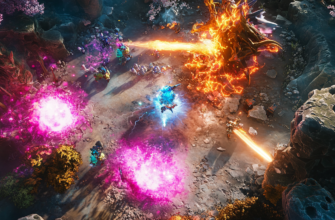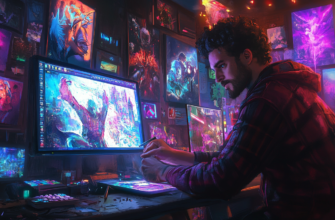The most fun games to learn programming
Alright, fellow gamers and future coders! You want to dive into the amazing world of programming, but you don’t want to start by grinding away on boring textbooks and dry tutorials? I feel you. The good news is, there’s a way to turn coding into play, and it’s through video games. In fact, there are some awesome games out there that will teach you the foundations of coding while offering pretty thrilling experiences. No need for a monotonous grind from day one—let’s launch directly into the **best games for learning programming** that turn you into a coding wizard!
Why learn programming through games?
If you’re a gamer like me, you already know that games can teach you a ton of useful stuff. Coordination, strategy, problem-solving—you’ve mastered it all in various game genres. The great thing about learning coding through games is that they deliver complex concepts in an approachable, fun way. Instead of staring at a text file full of code, you see applications to challenges in a visually engaging environment.
Games are by nature interactive, and when you’re practicing hands-on coding solutions in the form of a game, it becomes a much more integral learning process than theory alone ever could. Plus, you get instant feedback (which I know, we all love) allowing for fast learning without the typical frustrations. So without further ado, let’s look at my favorite games for getting into programming.
1. Human Resource Machine
If you love solving puzzles and want to learn programming concepts without even realizing it, Human Resource Machine is a fantastic place to begin. It teaches you assembly language in the form of tasks that you need to complete by automating workers in a factory setting.
- Why it’s great: The simplicity of the puzzles and their progression won’t intimidate beginners, while programmers will recognize and appreciate the concepts early on.
- Skills you’ll learn: Logical thinking, loops, conditionals, and basic algorithm design.
- Pro tip: Don’t be frustrated if things start to pick up in complexity. Break each task down into small steps—just like real-world programming. Completing each level thoughtfully ensures the most retention of concepts.
2. CodeCombat
If RPGs are your thing, you’ll absolutely love CodeCombat. In this browser-based game, you go on adventures through dungeons, battle monsters, and solve problems by typing real code like Python or JavaScript. The cool part is the direct feedback—input the wrong syntax, and your character won’t move correctly or might get defeated by an enemy. The immediate interaction keeps you hooked, and you’ll unintentionally start learning basic programming fundamentals.
- Why it’s great: Real coding within an enjoyable, casual game allows fast learning without getting bogged down by theory. It’s designed for complete beginners and slowly ramps up complexity as you progress.
- Skills you’ll learn: Python, JavaScript, control flow, functions, object-oriented programming, and more.
- Pro tip: Don’t hesitate to experiment with various code solutions! Trying multiple approaches will show you how different elements of a programming language work and how real-world coding is about finding the balance between functionality and efficiency.
3. Hack ‘n’ Slash
This is a game by Double Fine that combines Zelda-like gameplay with code editing mechanics. You play as a hacker who wields a special sword that can literally hack the game’s mechanics—changing enemy behavior and solving puzzles by altering the game’s code directly in a fun and creative environment.
- Why it’s great: It encourages experimentation and creative problem-solving using code, making it ideal for those looking to break out of the cookie-cutter coding examples.
- Skills you’ll learn: How variables, functions, and logic work in a dynamic way within a game loop situation.
- Pro tip: Play the game slowly and explore the different ways that modifying variables can shift gameplay. This will help you understand debugging in the ‘real’ coding world.
4. Colobot: Gold Edition
Colobot blends both adventure and programming, as you solve tasks in space by controlling robots. The commands you give them mirror Python-like syntax. It’s very open-ended, and you can create whole sequences of commands for your robots or vehicles to execute. Oh, and it’s open-source, so if you ever feel comfortable enough, you can even contribute to its development!
- Why it’s great: Tinkering with robots feels satisfying. It’s a solid balance between problem-solving and automation without hand-holding, fostering real initiative.
- Skills you’ll learn: Programming loops, AI behavior, recursion, and algorithm optimization.
- Pro tip: Dive into the open-source code if you’re feeling confident; it’s a great exercise for applying concepts you’ve learned directly into improving the game itself!
5. Robocode
This is a bigger one for those who want to dig deeper into artificial intelligence aspects of programming. In Robocode, you design the AI bots, programming their behavior through Java or .NET languages. Once you’ve built your bots, you pit them against others in battle simulation. If you’re competitive, this one’s going to grab you!
- Why it’s great: It’s a direct challenge to improve your bot’s efficiency since each opponent’s AI is uniquely designed—it pushes creativity and more advanced procedural thinking.
- Skills you’ll learn: Java, C#, AI algorithms, event handling, and procedural thinking.
- Pro tip: If you’re unfamiliar with Java, take it slow at the beginning; even tweaking simple bot movement can be tricky, but as your bot programming skills grow, you will feel a huge sense of accomplishment when you first win battles.
6. Exapunks
Zachtronics has a reputation for building complex puzzle games based on programming, and Exapunks is another fantastic addition. In this cyberpunk-style game, you take on the role of a hacker making deliveries, breaking into systems, and manipulating files. The coding structure is built around assembly-like programming, and it ramps up in difficulty with each mission.
- Why it’s great: The game gives you a sense of immersion by combining awesome aesthetics with deep programming challenges. It’s practically a digital playground for coders.
- Skills you’ll learn: Assembly language concepts, parallel processing, optimization of instructions, and string manipulation.
- Pro tip: Focus on small goals—completing each task may take multiple tries, but getting used to making gradual, incremental progress will serve you well both in the game and in real-world programming.
Honorable mentions
While the games listed above are some of my top recommendations, there are a few more titles that are worth checking out:
- Screeps: A highly competitive MMO where players build JavaScript-based AI to control an army of units within an open world. It’s not for beginners, but a solid deep dive for serious coders.
- Lightbot: More suited for kids and absolute newbies, this puzzle game focuses on understanding procedural logic and loops.
- 7 Billion Humans: A sequel to Human Resource Machine that introduces the concept of managing multiple individuals, bringing in parallel processing and multi-threaded workflows.
Tips for effective learning through games
- Be patient. Coding, like anything else, requires practice. Give yourself time to absorb each game mechanic.”
- Practice repetition. Don’t be afraid to replay levels where you were weak. It’s a classic move in gaming, and it works just as well for coding.
- Mix learning with traditional material. Games make learning fun, but supplementing with courses, YouTube tutorials, or books will give you a grasp on industry standard patterns and techniques you’ll need.
- Challenge yourself to think outside the box. The more creative you get with solutions, the deeper your understanding of programming will become.
Conclusion: becoming a talented programmer, one game at a time!
If you love gaming and are intrigued by programming, there’s no better way to start than by letting games teach you the core concepts. Whether you’re standing on the edge of a futuristic city, debugging space robots, or commanding AI armies, the games listed here show that coding is more than just commands and logic—it’s creativity, strategy, and problem-solving.
So pick a game, start coding, and you’ll be surprised at how fast you understand loops, algorithms, and data structures. Dive head-first, and don’t forget to enjoy the process. After all, you’re not just learning to code—you’re learning to create!
Got a favorite game that’s helped you learn programming? Let me know in the comments below!

















